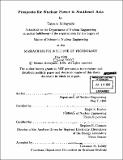Prospects for nuclear power in Southeast Asia
Author(s)
Kobayashi, Tatsuro, 1967-
DownloadFull printable version (8.301Mb)
Other Contributors
Massachusetts Institute of Technology. Dept. of Nuclear Engineering.
Advisor
Mujid S. Kazimi.
Terms of use
Metadata
Show full item recordAbstract
Southeast Asia needs strong financial and infrastructure bases for continuous development. in the next century. Although the turmoil of the 1997 Asian financial crisis slowed down economic growth the region is recovering gradually, and will need increasing energy supplies in the future. In the electricity sector, which has had to expand more slowly than it did in the 1980s, the main focus has been changing from how to satisfy the growing demand for high reliability to how to cut the cost of electricity. Under these circumstances, we examine the effective role of nuclear power, which can contribute to the stable supply of electricity and still meet the requirement of low emissions. A method of multi-attribute analysis is proposed to assess the feasibility of introducing nuclear power in combination with other generating facilities, such as natural gas, coal, oil and hydro. Capacity expansion plans from the year 2000 through 2020 in Japan Thailand, and Vietnam, which are composed by a technique of dynamic expansion planning, are evaluated on the basis of total costs, emissions, waste and energy security. In addition, the impact of electricity trade in Southeast Asia on the role of nuclear power is examined. This work concludes that nuclear power is compatible with the energy, economic and environmental conditions that may prevail in the region. The factors that promote nuclear power are: its low variable costs, the need for financial stability against unexpected economic disruptions of gas prices low interest rates to finance its capital needs and the limitation on CO2 emissions due to international concerns about global climate change.
Description
Thesis (S.M.)--Massachusetts Institute of Technology, Dept. of Nuclear Engineering, 1999. Includes bibliographical references (p. 165-167).
Date issued
1999Department
Massachusetts Institute of Technology. Department of Nuclear Engineering; Massachusetts Institute of Technology. Department of Nuclear Science and EngineeringPublisher
Massachusetts Institute of Technology
Keywords
Nuclear Engineering.